Ethics Case Study: Data Dilemma and Ethical Decision Making
VerifiedAdded on 2020/03/04
|7
|1370
|53
Case Study
AI Summary
This case study presents an ethical dilemma faced by a supermarket owner who receives an offer to sell customer data to a friend's company. The assignment explores three potential options: accepting the offer, rejecting the offer, or accepting the offer with conditions. The analysis applies both virtue ethics and deontology to evaluate the ethical implications of each choice. The student considers the impact on customer privacy, business relationships, and the company's integrity. Ultimately, the student, using Kant's theory, concludes that accepting the deal with a condition of confidentiality is the most appropriate option, balancing the interests of all stakeholders and preserving goodwill. The assignment demonstrates the application of ethical theories in a business context, emphasizing the importance of critical thinking and ethical decision-making in resolving complex situations.
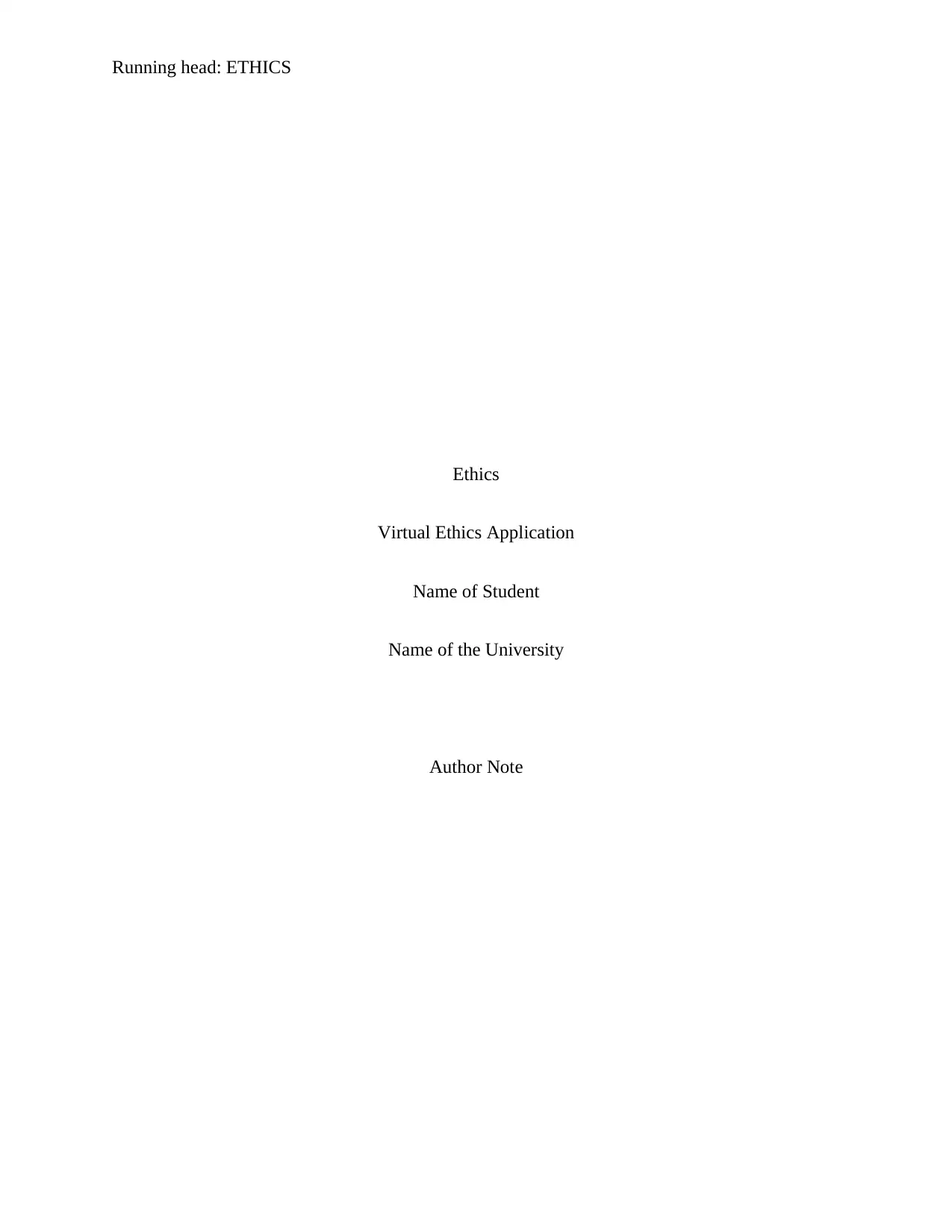
Running head: ETHICS
Ethics
Virtual Ethics Application
Name of Student
Name of the University
Author Note
Ethics
Virtual Ethics Application
Name of Student
Name of the University
Author Note
Paraphrase This Document
Need a fresh take? Get an instant paraphrase of this document with our AI Paraphraser
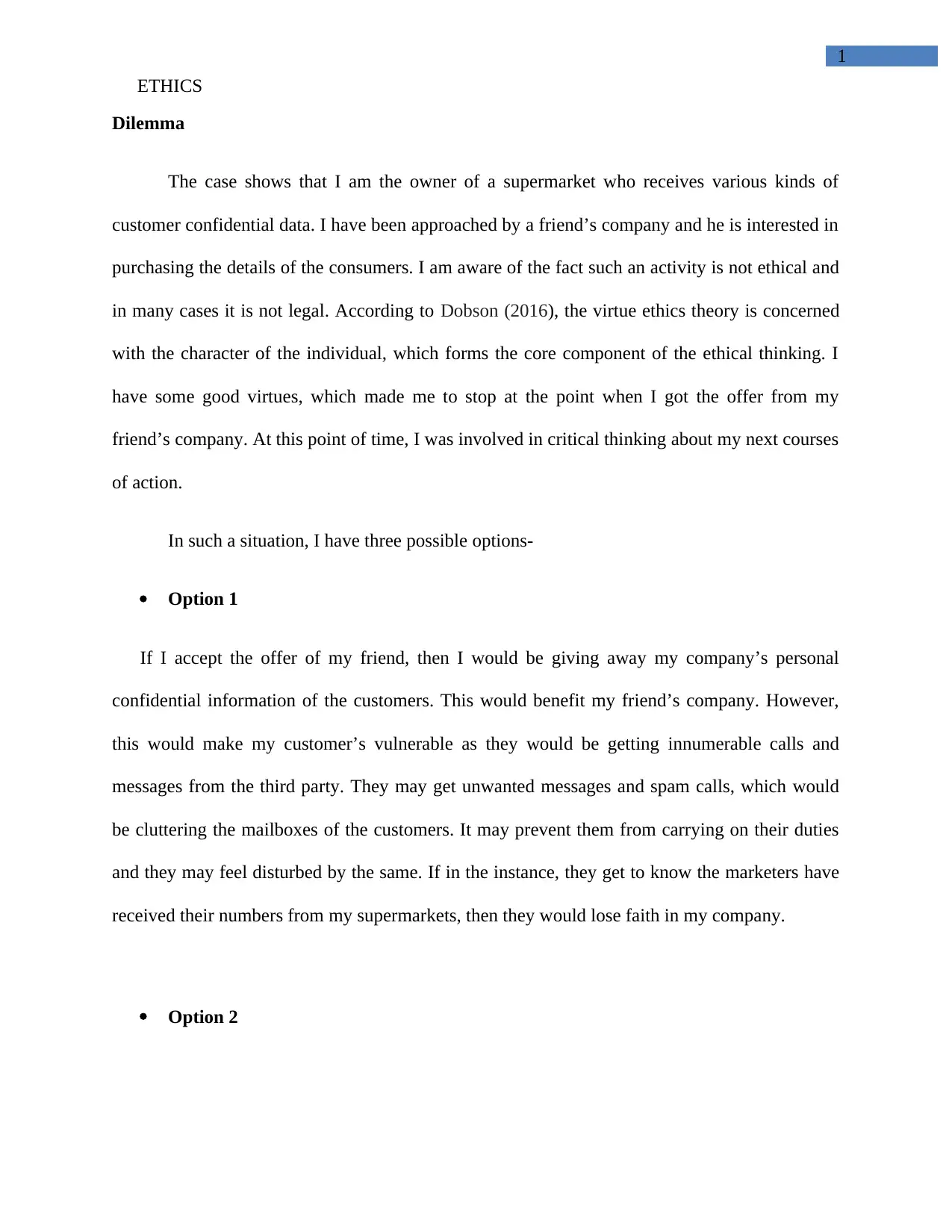
1
ETHICS
Dilemma
The case shows that I am the owner of a supermarket who receives various kinds of
customer confidential data. I have been approached by a friend’s company and he is interested in
purchasing the details of the consumers. I am aware of the fact such an activity is not ethical and
in many cases it is not legal. According to Dobson (2016), the virtue ethics theory is concerned
with the character of the individual, which forms the core component of the ethical thinking. I
have some good virtues, which made me to stop at the point when I got the offer from my
friend’s company. At this point of time, I was involved in critical thinking about my next courses
of action.
In such a situation, I have three possible options-
Option 1
If I accept the offer of my friend, then I would be giving away my company’s personal
confidential information of the customers. This would benefit my friend’s company. However,
this would make my customer’s vulnerable as they would be getting innumerable calls and
messages from the third party. They may get unwanted messages and spam calls, which would
be cluttering the mailboxes of the customers. It may prevent them from carrying on their duties
and they may feel disturbed by the same. If in the instance, they get to know the marketers have
received their numbers from my supermarkets, then they would lose faith in my company.
Option 2
ETHICS
Dilemma
The case shows that I am the owner of a supermarket who receives various kinds of
customer confidential data. I have been approached by a friend’s company and he is interested in
purchasing the details of the consumers. I am aware of the fact such an activity is not ethical and
in many cases it is not legal. According to Dobson (2016), the virtue ethics theory is concerned
with the character of the individual, which forms the core component of the ethical thinking. I
have some good virtues, which made me to stop at the point when I got the offer from my
friend’s company. At this point of time, I was involved in critical thinking about my next courses
of action.
In such a situation, I have three possible options-
Option 1
If I accept the offer of my friend, then I would be giving away my company’s personal
confidential information of the customers. This would benefit my friend’s company. However,
this would make my customer’s vulnerable as they would be getting innumerable calls and
messages from the third party. They may get unwanted messages and spam calls, which would
be cluttering the mailboxes of the customers. It may prevent them from carrying on their duties
and they may feel disturbed by the same. If in the instance, they get to know the marketers have
received their numbers from my supermarkets, then they would lose faith in my company.
Option 2
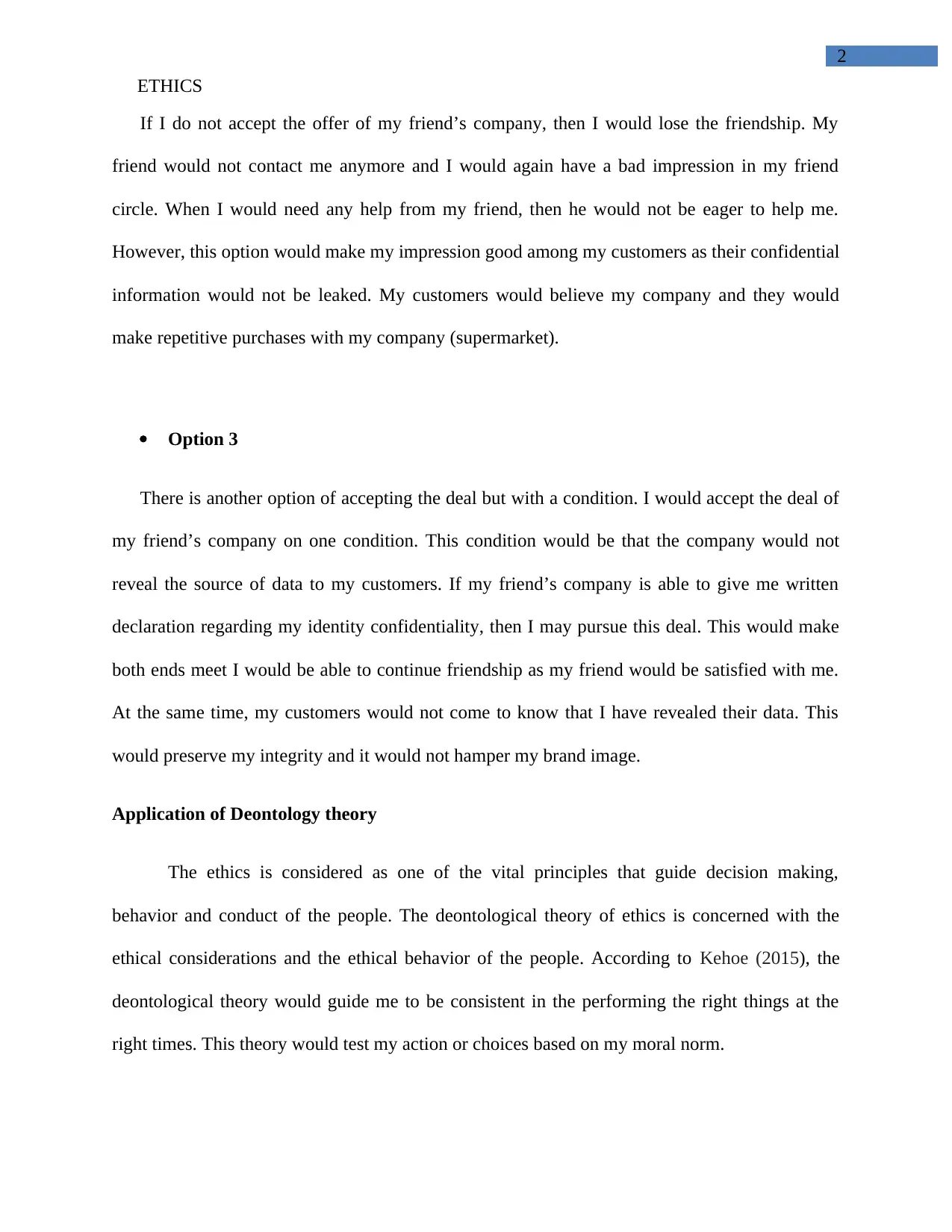
2
ETHICS
If I do not accept the offer of my friend’s company, then I would lose the friendship. My
friend would not contact me anymore and I would again have a bad impression in my friend
circle. When I would need any help from my friend, then he would not be eager to help me.
However, this option would make my impression good among my customers as their confidential
information would not be leaked. My customers would believe my company and they would
make repetitive purchases with my company (supermarket).
Option 3
There is another option of accepting the deal but with a condition. I would accept the deal of
my friend’s company on one condition. This condition would be that the company would not
reveal the source of data to my customers. If my friend’s company is able to give me written
declaration regarding my identity confidentiality, then I may pursue this deal. This would make
both ends meet I would be able to continue friendship as my friend would be satisfied with me.
At the same time, my customers would not come to know that I have revealed their data. This
would preserve my integrity and it would not hamper my brand image.
Application of Deontology theory
The ethics is considered as one of the vital principles that guide decision making,
behavior and conduct of the people. The deontological theory of ethics is concerned with the
ethical considerations and the ethical behavior of the people. According to Kehoe (2015), the
deontological theory would guide me to be consistent in the performing the right things at the
right times. This theory would test my action or choices based on my moral norm.
ETHICS
If I do not accept the offer of my friend’s company, then I would lose the friendship. My
friend would not contact me anymore and I would again have a bad impression in my friend
circle. When I would need any help from my friend, then he would not be eager to help me.
However, this option would make my impression good among my customers as their confidential
information would not be leaked. My customers would believe my company and they would
make repetitive purchases with my company (supermarket).
Option 3
There is another option of accepting the deal but with a condition. I would accept the deal of
my friend’s company on one condition. This condition would be that the company would not
reveal the source of data to my customers. If my friend’s company is able to give me written
declaration regarding my identity confidentiality, then I may pursue this deal. This would make
both ends meet I would be able to continue friendship as my friend would be satisfied with me.
At the same time, my customers would not come to know that I have revealed their data. This
would preserve my integrity and it would not hamper my brand image.
Application of Deontology theory
The ethics is considered as one of the vital principles that guide decision making,
behavior and conduct of the people. The deontological theory of ethics is concerned with the
ethical considerations and the ethical behavior of the people. According to Kehoe (2015), the
deontological theory would guide me to be consistent in the performing the right things at the
right times. This theory would test my action or choices based on my moral norm.
⊘ This is a preview!⊘
Do you want full access?
Subscribe today to unlock all pages.

Trusted by 1+ million students worldwide
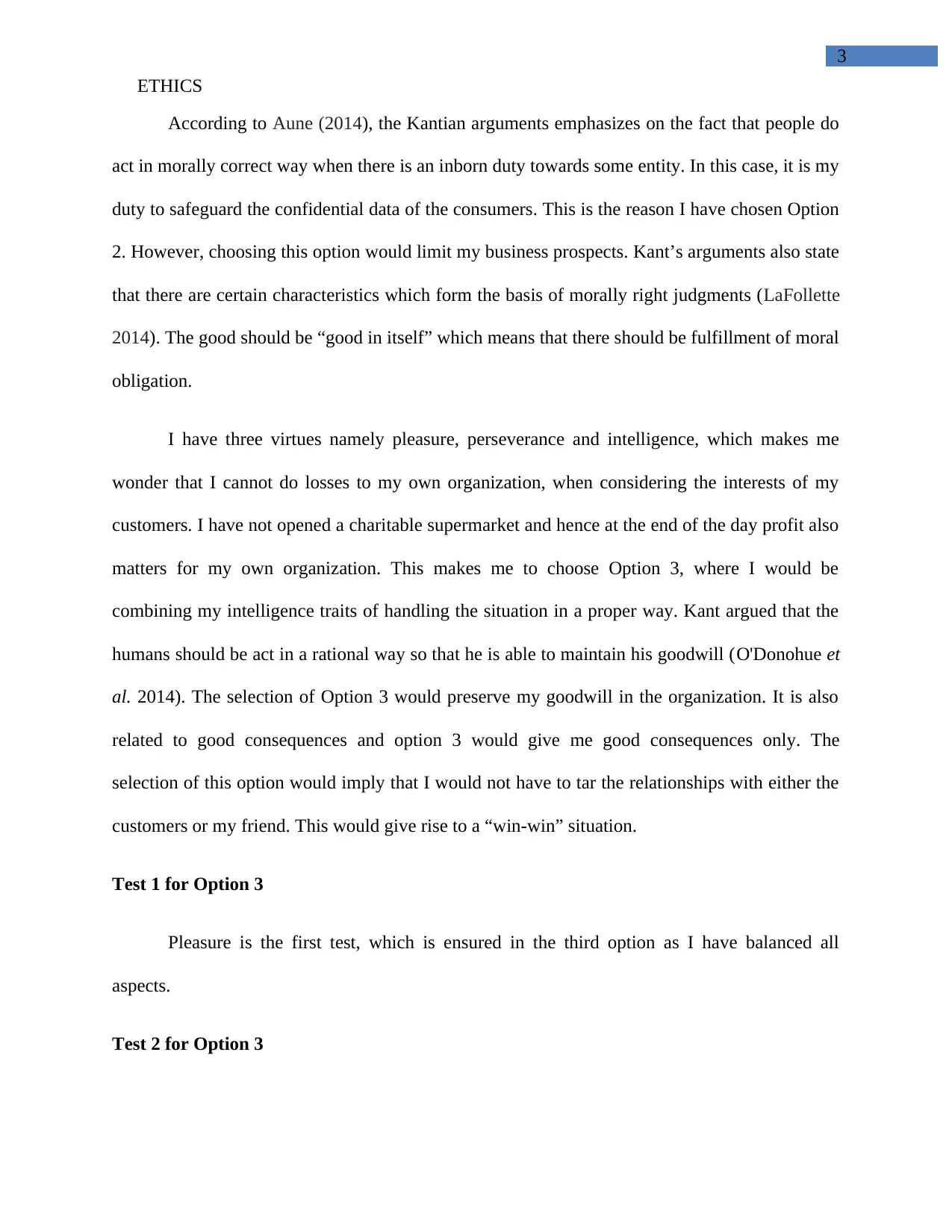
3
ETHICS
According to Aune (2014), the Kantian arguments emphasizes on the fact that people do
act in morally correct way when there is an inborn duty towards some entity. In this case, it is my
duty to safeguard the confidential data of the consumers. This is the reason I have chosen Option
2. However, choosing this option would limit my business prospects. Kant’s arguments also state
that there are certain characteristics which form the basis of morally right judgments (LaFollette
2014). The good should be “good in itself” which means that there should be fulfillment of moral
obligation.
I have three virtues namely pleasure, perseverance and intelligence, which makes me
wonder that I cannot do losses to my own organization, when considering the interests of my
customers. I have not opened a charitable supermarket and hence at the end of the day profit also
matters for my own organization. This makes me to choose Option 3, where I would be
combining my intelligence traits of handling the situation in a proper way. Kant argued that the
humans should be act in a rational way so that he is able to maintain his goodwill (O'Donohue et
al. 2014). The selection of Option 3 would preserve my goodwill in the organization. It is also
related to good consequences and option 3 would give me good consequences only. The
selection of this option would imply that I would not have to tar the relationships with either the
customers or my friend. This would give rise to a “win-win” situation.
Test 1 for Option 3
Pleasure is the first test, which is ensured in the third option as I have balanced all
aspects.
Test 2 for Option 3
ETHICS
According to Aune (2014), the Kantian arguments emphasizes on the fact that people do
act in morally correct way when there is an inborn duty towards some entity. In this case, it is my
duty to safeguard the confidential data of the consumers. This is the reason I have chosen Option
2. However, choosing this option would limit my business prospects. Kant’s arguments also state
that there are certain characteristics which form the basis of morally right judgments (LaFollette
2014). The good should be “good in itself” which means that there should be fulfillment of moral
obligation.
I have three virtues namely pleasure, perseverance and intelligence, which makes me
wonder that I cannot do losses to my own organization, when considering the interests of my
customers. I have not opened a charitable supermarket and hence at the end of the day profit also
matters for my own organization. This makes me to choose Option 3, where I would be
combining my intelligence traits of handling the situation in a proper way. Kant argued that the
humans should be act in a rational way so that he is able to maintain his goodwill (O'Donohue et
al. 2014). The selection of Option 3 would preserve my goodwill in the organization. It is also
related to good consequences and option 3 would give me good consequences only. The
selection of this option would imply that I would not have to tar the relationships with either the
customers or my friend. This would give rise to a “win-win” situation.
Test 1 for Option 3
Pleasure is the first test, which is ensured in the third option as I have balanced all
aspects.
Test 2 for Option 3
Paraphrase This Document
Need a fresh take? Get an instant paraphrase of this document with our AI Paraphraser
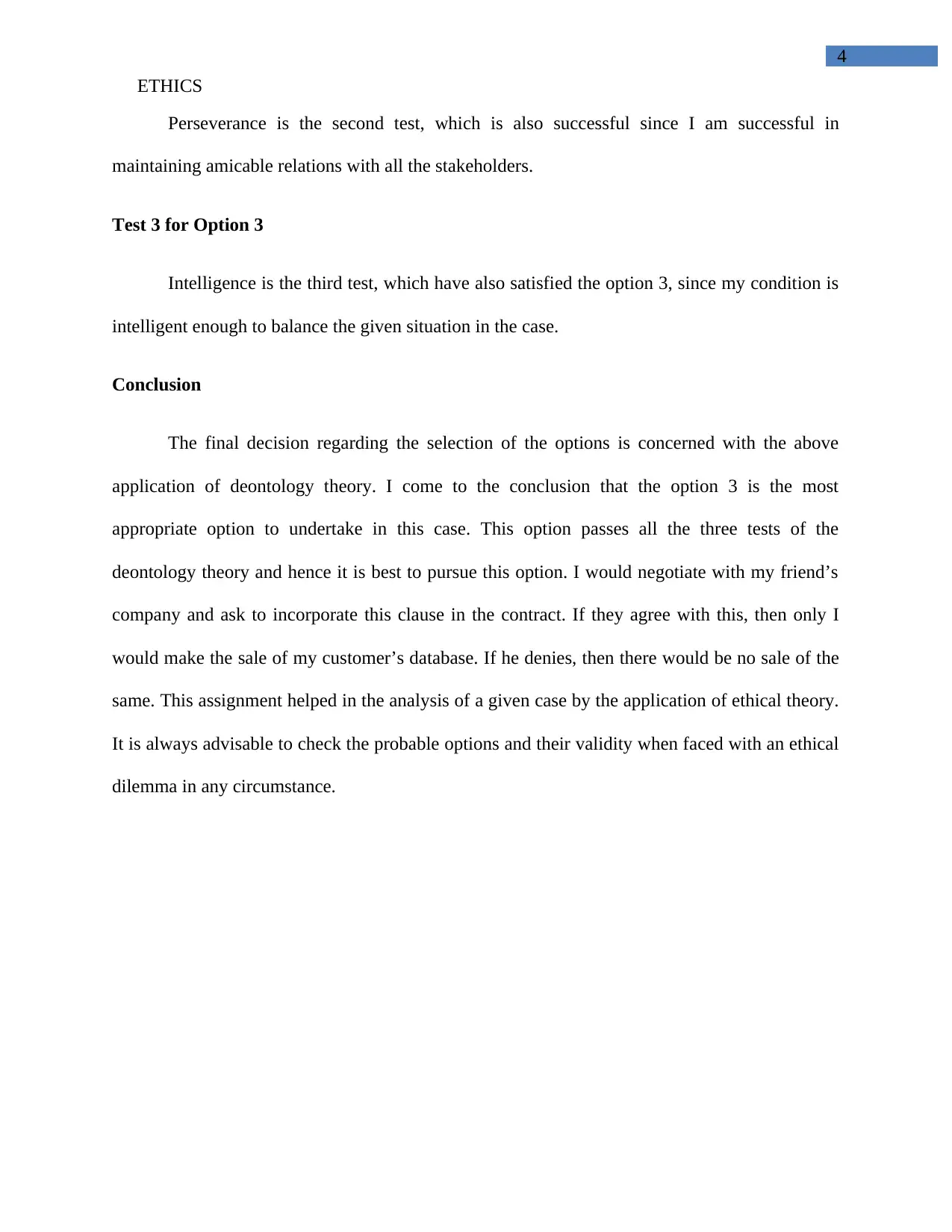
4
ETHICS
Perseverance is the second test, which is also successful since I am successful in
maintaining amicable relations with all the stakeholders.
Test 3 for Option 3
Intelligence is the third test, which have also satisfied the option 3, since my condition is
intelligent enough to balance the given situation in the case.
Conclusion
The final decision regarding the selection of the options is concerned with the above
application of deontology theory. I come to the conclusion that the option 3 is the most
appropriate option to undertake in this case. This option passes all the three tests of the
deontology theory and hence it is best to pursue this option. I would negotiate with my friend’s
company and ask to incorporate this clause in the contract. If they agree with this, then only I
would make the sale of my customer’s database. If he denies, then there would be no sale of the
same. This assignment helped in the analysis of a given case by the application of ethical theory.
It is always advisable to check the probable options and their validity when faced with an ethical
dilemma in any circumstance.
ETHICS
Perseverance is the second test, which is also successful since I am successful in
maintaining amicable relations with all the stakeholders.
Test 3 for Option 3
Intelligence is the third test, which have also satisfied the option 3, since my condition is
intelligent enough to balance the given situation in the case.
Conclusion
The final decision regarding the selection of the options is concerned with the above
application of deontology theory. I come to the conclusion that the option 3 is the most
appropriate option to undertake in this case. This option passes all the three tests of the
deontology theory and hence it is best to pursue this option. I would negotiate with my friend’s
company and ask to incorporate this clause in the contract. If they agree with this, then only I
would make the sale of my customer’s database. If he denies, then there would be no sale of the
same. This assignment helped in the analysis of a given case by the application of ethical theory.
It is always advisable to check the probable options and their validity when faced with an ethical
dilemma in any circumstance.
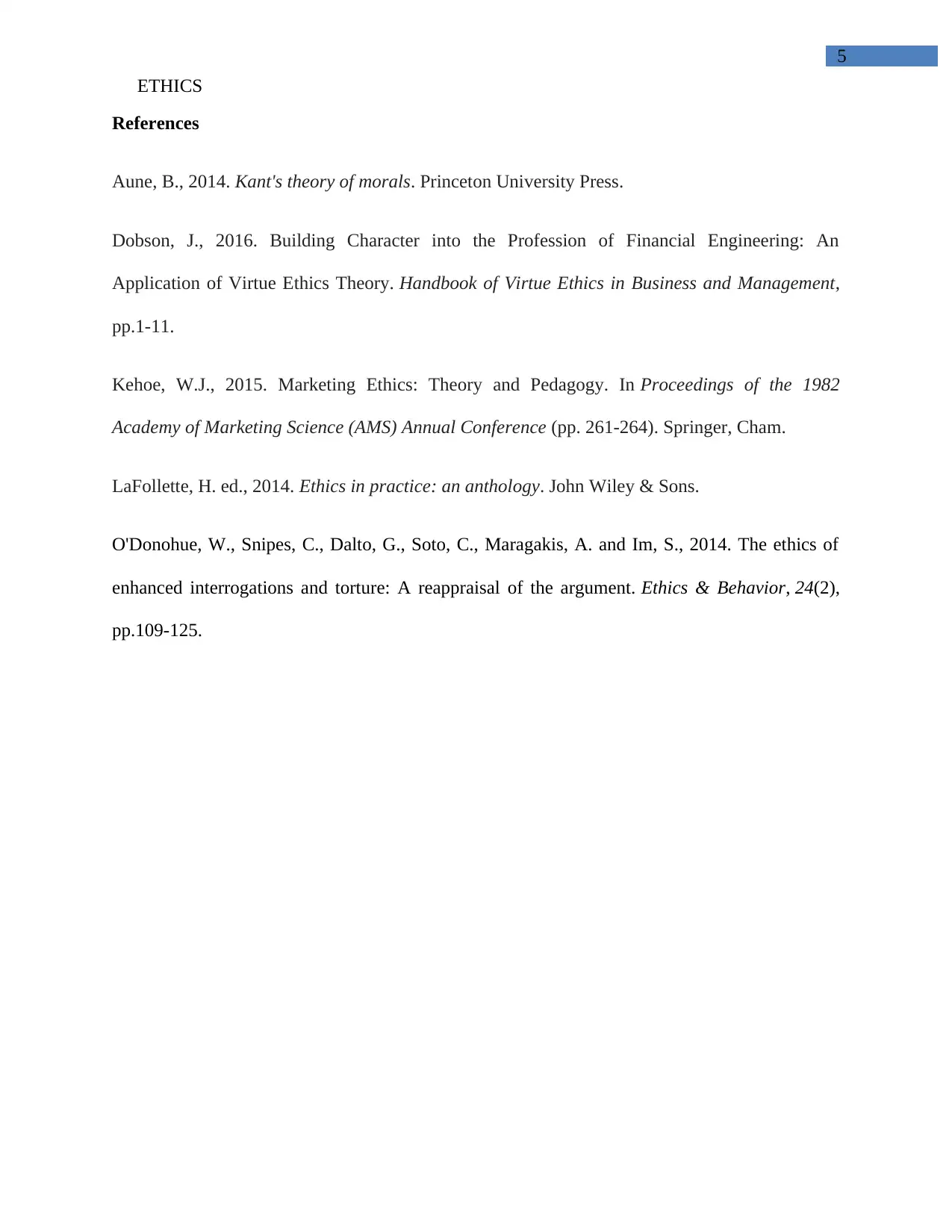
5
ETHICS
References
Aune, B., 2014. Kant's theory of morals. Princeton University Press.
Dobson, J., 2016. Building Character into the Profession of Financial Engineering: An
Application of Virtue Ethics Theory. Handbook of Virtue Ethics in Business and Management,
pp.1-11.
Kehoe, W.J., 2015. Marketing Ethics: Theory and Pedagogy. In Proceedings of the 1982
Academy of Marketing Science (AMS) Annual Conference (pp. 261-264). Springer, Cham.
LaFollette, H. ed., 2014. Ethics in practice: an anthology. John Wiley & Sons.
O'Donohue, W., Snipes, C., Dalto, G., Soto, C., Maragakis, A. and Im, S., 2014. The ethics of
enhanced interrogations and torture: A reappraisal of the argument. Ethics & Behavior, 24(2),
pp.109-125.
ETHICS
References
Aune, B., 2014. Kant's theory of morals. Princeton University Press.
Dobson, J., 2016. Building Character into the Profession of Financial Engineering: An
Application of Virtue Ethics Theory. Handbook of Virtue Ethics in Business and Management,
pp.1-11.
Kehoe, W.J., 2015. Marketing Ethics: Theory and Pedagogy. In Proceedings of the 1982
Academy of Marketing Science (AMS) Annual Conference (pp. 261-264). Springer, Cham.
LaFollette, H. ed., 2014. Ethics in practice: an anthology. John Wiley & Sons.
O'Donohue, W., Snipes, C., Dalto, G., Soto, C., Maragakis, A. and Im, S., 2014. The ethics of
enhanced interrogations and torture: A reappraisal of the argument. Ethics & Behavior, 24(2),
pp.109-125.
⊘ This is a preview!⊘
Do you want full access?
Subscribe today to unlock all pages.

Trusted by 1+ million students worldwide
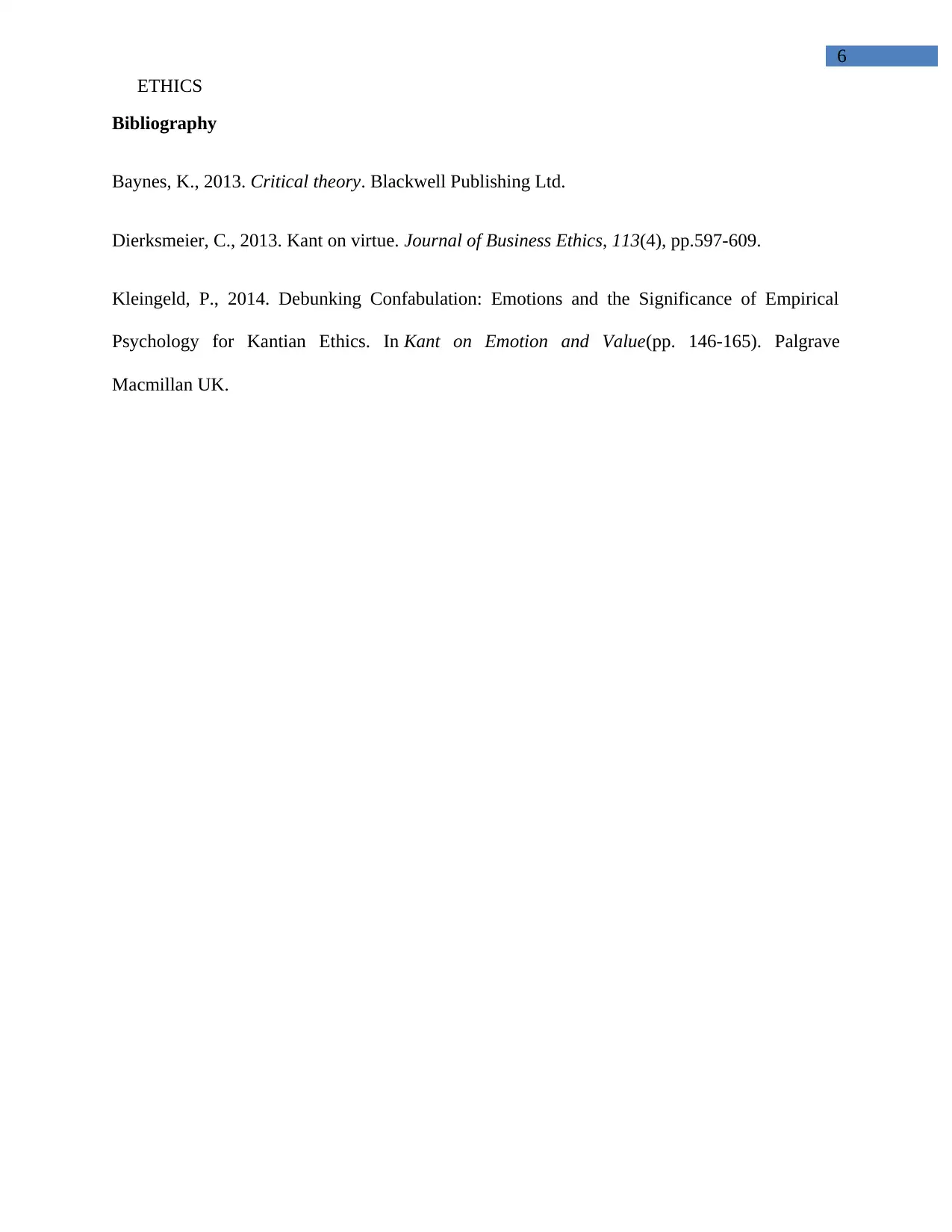
6
ETHICS
Bibliography
Baynes, K., 2013. Critical theory. Blackwell Publishing Ltd.
Dierksmeier, C., 2013. Kant on virtue. Journal of Business Ethics, 113(4), pp.597-609.
Kleingeld, P., 2014. Debunking Confabulation: Emotions and the Significance of Empirical
Psychology for Kantian Ethics. In Kant on Emotion and Value(pp. 146-165). Palgrave
Macmillan UK.
ETHICS
Bibliography
Baynes, K., 2013. Critical theory. Blackwell Publishing Ltd.
Dierksmeier, C., 2013. Kant on virtue. Journal of Business Ethics, 113(4), pp.597-609.
Kleingeld, P., 2014. Debunking Confabulation: Emotions and the Significance of Empirical
Psychology for Kantian Ethics. In Kant on Emotion and Value(pp. 146-165). Palgrave
Macmillan UK.
1 out of 7
Related Documents
Your All-in-One AI-Powered Toolkit for Academic Success.
+13062052269
info@desklib.com
Available 24*7 on WhatsApp / Email
![[object Object]](/_next/static/media/star-bottom.7253800d.svg)
Unlock your academic potential
Copyright © 2020–2026 A2Z Services. All Rights Reserved. Developed and managed by ZUCOL.





